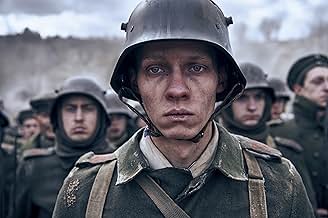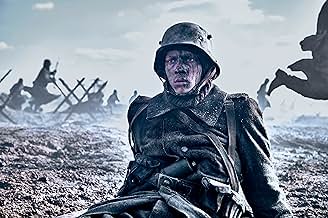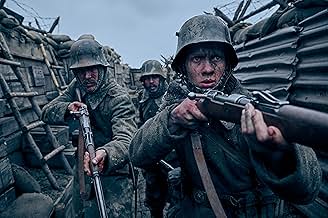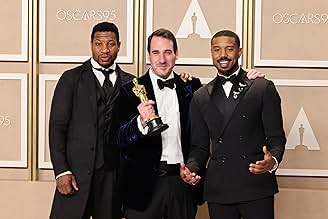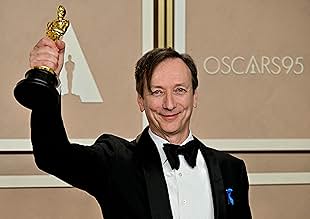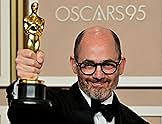Cuando Paul, de 17 años, se une al frente occidental en la Primera Guerra Mundial, su entusiasmo se derrumba rápidamente ante la dura realidad de la vida en las trincheras.Cuando Paul, de 17 años, se une al frente occidental en la Primera Guerra Mundial, su entusiasmo se derrumba rápidamente ante la dura realidad de la vida en las trincheras.Cuando Paul, de 17 años, se une al frente occidental en la Primera Guerra Mundial, su entusiasmo se derrumba rápidamente ante la dura realidad de la vida en las trincheras.
- Dirección
- Guionistas
- Elenco
- Ganó 4 premios Óscar
- 59 premios ganados y 89 nominaciones en total
Opiniones destacadas
Germany, May 1917. 17-year-old Paul Baumer enthusiastically enlists in the German army and heads off to war. His head is filled with patriotism, honour, visions of heroism and the confidence that Germany will win the war. He soon learns that his impressions of war are far from the reality.
Erich Maria Remarque's "All Quiet on the Western Front" was first published in 1929. It was quite revolutionary, depicting the horrific reality of war rather than the glamourous, sanitised version. In a sense it was the first anti-war novel. It was so unflinching in its portrayal of WW1 that the Nazi party regarded it as treasonous and had the book banned and stripped Remarque of his German citizenship, causing him to flee to Switzerland and ultimately the US.
In 1930 Hollywood made the book into a movie. It was superb, capturing well the horrors that Remarque depicted in his book. It deservedly won the Oscar for Best Picture (and Best Director) in 1930.
In 1979 it was adapted again, this time as a made-for-TV movie. Despite being directed by Delbert Mann and boasting a star-studded cast (Richard Thomas, Ernest Borgnine, Ian Holm, Donald Pleasance) this version was far from being in the same league as the 1930 version and didn't do the book justice. It is quite tame and the performances are quite subdued.
This, the 2022 version, once again captures the essence of the book and is quite unflinching in its portrayal of war. Graphic scenes and realistic plot show the wastefulness and horror of war.
Not as good as the 1930 version though: the characters aren't as fully developed, limiting engagement, and the plot feels a bit padded. A few drawn out scenes could easily have been shorter without losing any detail. Some style-over-substance elements too as the director went overboard with the special effects he had at his disposal (the French counter-attack with tanks and flamethrowers is a good example). The droning sound didn't help either (clearly the director has watched Christopher Nolan's "Dunkirk").
Erich Maria Remarque's "All Quiet on the Western Front" was first published in 1929. It was quite revolutionary, depicting the horrific reality of war rather than the glamourous, sanitised version. In a sense it was the first anti-war novel. It was so unflinching in its portrayal of WW1 that the Nazi party regarded it as treasonous and had the book banned and stripped Remarque of his German citizenship, causing him to flee to Switzerland and ultimately the US.
In 1930 Hollywood made the book into a movie. It was superb, capturing well the horrors that Remarque depicted in his book. It deservedly won the Oscar for Best Picture (and Best Director) in 1930.
In 1979 it was adapted again, this time as a made-for-TV movie. Despite being directed by Delbert Mann and boasting a star-studded cast (Richard Thomas, Ernest Borgnine, Ian Holm, Donald Pleasance) this version was far from being in the same league as the 1930 version and didn't do the book justice. It is quite tame and the performances are quite subdued.
This, the 2022 version, once again captures the essence of the book and is quite unflinching in its portrayal of war. Graphic scenes and realistic plot show the wastefulness and horror of war.
Not as good as the 1930 version though: the characters aren't as fully developed, limiting engagement, and the plot feels a bit padded. A few drawn out scenes could easily have been shorter without losing any detail. Some style-over-substance elements too as the director went overboard with the special effects he had at his disposal (the French counter-attack with tanks and flamethrowers is a good example). The droning sound didn't help either (clearly the director has watched Christopher Nolan's "Dunkirk").
A fascinating film with potential that was never fully achieved. "All Quiet on the Western Front" does not rely solely on shock value to disturb its audience; instead, it uses the horrors of war to sober them with facts and dismal realities. The film's story was worth telling; it left an impression long after the credits rolled. It dealt with many weighty themes, including a young man's journey through war, the difficulties of combat, the cruelty of desperation, and the value of friendship and camaraderie, all of which were handled with grace and artistry. Furthermore, it boasted first-rate production values, breathtaking visuals, a terrific score (although maybe a tad bit over the top), and stellar acting. Although there is much to praise about the film, "All Quiet on the Western Front" is ultimately hampered by its drawn-out length, the plot dragging in spots, and several confusing moments. All the pieces were in place for "All Quiet on the Western Front" to be the best picture of the year, and in some respects, it is. Fans of the genre, or anyone who appreciates a well-made film, should not miss this film despite its limitations.
Rating: 7.5/10 (Impressive)
Rating: 7.5/10 (Impressive)
Oh dear. I still feel bad. But not because the film is bad. Because it shows how incredibly bad that time was. Especially for the young men who were forced to go to war. I'm from Osnabrück - the city where Erich Maria Remarque was born - and when they named the city in the film... my body is still shaking. The actors were amazing. I dont like german films so much, but this is different. The camera, the sound. Its perfect (except one role - otherwise it would be a 10 for me). I even didn't touch my snacks in the cinema. You really have to see this movie. Because it shows the cruel time in a way that perhaps no film has ever done before. However, if you want to spend a nice evening in a good mood, don't watch it. Because it really pulls you down. But it's all worth it. Thanks for this history lesson!
This movie did something I didn't expect from a World War movie...it makes you feel empathetic for the Germans. To an extent.
I'm no war buff so I'll leave the realism to the experts but what this movie does is show you the first World War from the view point of people who've never experienced or even conceived of war and bloodshed on this scale. It starts off with new recruits full of patriotism for their country expecting to be sent on a grand adventure only to have those expectations quickly shattered. Turns out war isn't fun, and not even initially due to the actual fighting. Just training and constantly being screamed at and controlled while marching your days away is brutal. Remember, while vehicles existed, they weren't common use at this period of time...these soldiers had to walk, walk, and walk some more to get to where the war effort was taking place. And even if they had vehicles most of those places didn't have roads yet to drive them on. Then there's the constant lack of food and water, rough sleeping conditions, being exposed to the elements. Just GETTING to the war is brutal. That's a good 3rd of the movie right there.
Then close to the half way point, after a few minor skirmishes, we see the war front and the trenches and get to see what that's like. Well...it's terrible! You pop up out of a trench and boom...you're shot. And that's just life in between charges. There was no strategy to the charges either, they relied on waves of bodies to gain even 100 meters, hoping to out pace the bullets constantly coming your way. Millions of young men died in this fashion, their bodies littering the field.
The most brutal part of the film is the weapons of war never before seen. Tanks, flame throwers, planes dropping bombs. Men screaming in pure terror while the bullet proof tanks drive over them, while flames fill their trenches, or planes blow them up while they flee.
And the odd thing is since we're seeing it from the eyes of the young German soldiers, who are truly clueless as to why they're really even fighting, you do empathize and feel sorry for them. You find yourself even rooting for them. This movie humanizes them but importantly shows the politicians who are truly to blame for the atrocities. The powerful men behind the scenes, bloated from being overfed on rich foods, hundreds of miles away from the pain and suffering they cause.
I have no idea how accurate this movie is but it's a pretty straight forward piece showing just how awful, terrifying, and destructive this period of time was. I really enjoyed it and recommend it to any fans of this genre.
I'm no war buff so I'll leave the realism to the experts but what this movie does is show you the first World War from the view point of people who've never experienced or even conceived of war and bloodshed on this scale. It starts off with new recruits full of patriotism for their country expecting to be sent on a grand adventure only to have those expectations quickly shattered. Turns out war isn't fun, and not even initially due to the actual fighting. Just training and constantly being screamed at and controlled while marching your days away is brutal. Remember, while vehicles existed, they weren't common use at this period of time...these soldiers had to walk, walk, and walk some more to get to where the war effort was taking place. And even if they had vehicles most of those places didn't have roads yet to drive them on. Then there's the constant lack of food and water, rough sleeping conditions, being exposed to the elements. Just GETTING to the war is brutal. That's a good 3rd of the movie right there.
Then close to the half way point, after a few minor skirmishes, we see the war front and the trenches and get to see what that's like. Well...it's terrible! You pop up out of a trench and boom...you're shot. And that's just life in between charges. There was no strategy to the charges either, they relied on waves of bodies to gain even 100 meters, hoping to out pace the bullets constantly coming your way. Millions of young men died in this fashion, their bodies littering the field.
The most brutal part of the film is the weapons of war never before seen. Tanks, flame throwers, planes dropping bombs. Men screaming in pure terror while the bullet proof tanks drive over them, while flames fill their trenches, or planes blow them up while they flee.
And the odd thing is since we're seeing it from the eyes of the young German soldiers, who are truly clueless as to why they're really even fighting, you do empathize and feel sorry for them. You find yourself even rooting for them. This movie humanizes them but importantly shows the politicians who are truly to blame for the atrocities. The powerful men behind the scenes, bloated from being overfed on rich foods, hundreds of miles away from the pain and suffering they cause.
I have no idea how accurate this movie is but it's a pretty straight forward piece showing just how awful, terrifying, and destructive this period of time was. I really enjoyed it and recommend it to any fans of this genre.
In the excellent 1930s original, war is seldom better summarised than by: 'It's dirty and painful to die for your country, when it comes to dying for your country it's better not to die at all. There are millions out there dying for their countries, and what good does it do?'.
It's a statement that applies just as well today, and complimented by this outstanding piece of film making too, which leaves us under no illusions of man's inhumanity to man. The performances are truly incredible, the technical achievement recreating scenes of war outstanding, and the messages as clear as any about the futility of armed combat and the inability of the human race to learn its lessons - even to this day. Not really a film to enjoy, but certainly a film to reflect on how far we haven't come since 1918, especially in a world that often seems so intent on pulling itself apart.
It's a statement that applies just as well today, and complimented by this outstanding piece of film making too, which leaves us under no illusions of man's inhumanity to man. The performances are truly incredible, the technical achievement recreating scenes of war outstanding, and the messages as clear as any about the futility of armed combat and the inability of the human race to learn its lessons - even to this day. Not really a film to enjoy, but certainly a film to reflect on how far we haven't come since 1918, especially in a world that often seems so intent on pulling itself apart.
¿Sabías que…?
- TriviaErich Maria Remarque's book was inspired by his own experiences as a German soldier in World War I. Remarque fought in the trenches and the novel is notable for its realistic depiction of the horrors of battle, and the trouble soldiers face during and even after the fighting.
- ErroresBy the end, Germany's delegation to Rethondes appears indignant as the terms and conditions of armistice are quoted by Mathias Erzberger, namely forfeiting submarines, planes, weapons and so on; what is read there was not in the November 11, 1918 capitulation act but was imposed upon Germany next year in the Treaty of Versailles.
- Citas
Matthias Erzberger: All that's left separating us from an armistice is false pride.
- ConexionesFeatured in Business Now: Episode dated 19 October 2022 (2022)
- Bandas sonorasEbben? Ne andrò lontana ('La Wally', Act 1)
Written by Alfredo Catalani and Luigi Illica
Performed by Maria Luigia Borsi
Selecciones populares
Inicia sesión para calificar y agrega a la lista de videos para obtener recomendaciones personalizadas
Detalles
- Fecha de lanzamiento
- Países de origen
- Sitio oficial
- Idiomas
- También se conoce como
- All Quiet on the Western Front
- Locaciones de filmación
- Productoras
- Ver más créditos de la compañía en IMDbPro
- Tiempo de ejecución2 horas 28 minutos
- Color
- Mezcla de sonido
- Relación de aspecto
- 2.39 : 1
Contribuir a esta página
Sugiere una edición o agrega el contenido que falta





